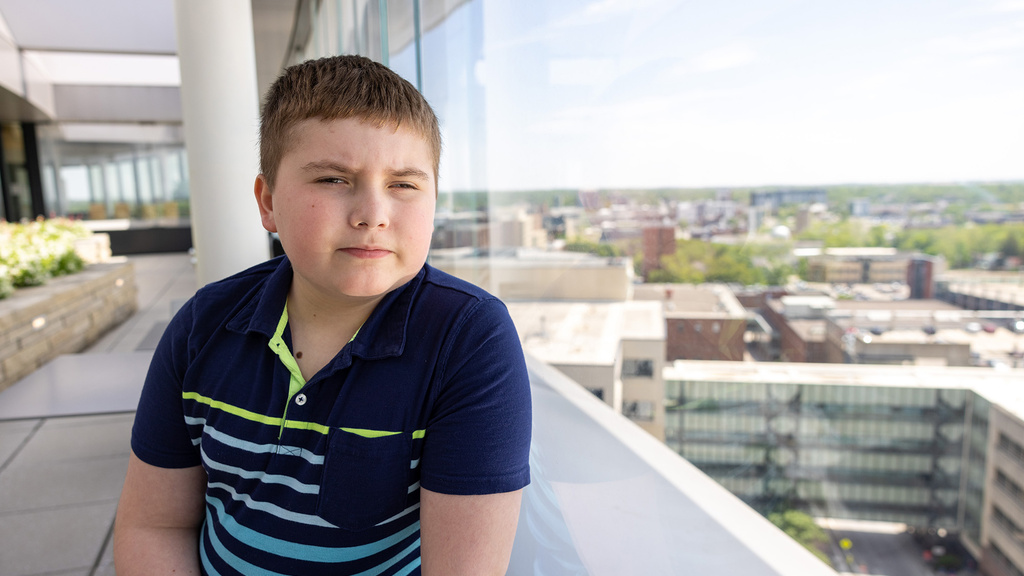Watching your baby go into open-heart surgery is scary, but a Grinnell, Iowa, family says everyone at University of Iowa Health Care Stead Family Children’s Hospital was so calm, confident, and caring that it made them feel at peace.
Story: Emily Neslon
Photography: Justin Torner
Published: April 9, 2021
If Rohen Carberry isn’t right in the middle of the action—especially where his brothers are concerned—he’ll squirm out of your arms in an attempt to get there. And once the nearly 1-year-old gets there, he just laughs.
“He’s a social butterfly,” says his mom, Kristina Carberry.
Rohen has come a long way since spending 30 days in the neonatal intensive care unit (NICU) after he was born in May 2020 and having open-heart surgery at University of Iowa Health Care Stead Family Children’s Hospital a few months after that.
Kristina and her husband, Jason, learned early in the pregnancy through noninvasive prenatal testing (NIPT) that Rohen had an increased chance of having trisomy 21, or Down syndrome. Further testing confirmed the diagnosis.
“We love children with special needs, so it was kind of fitting he joined our family,” Carberry says.
Congenital heart defects are common in babies with Down syndrome. The 20-week ultrasound showed that Rohen did indeed have a heart defect, and the Grinnell, Iowa, family was referred to pediatric cardiology at UI Health Care Stead Family Children’s Hospital, the state’s only nationally ranked children’s hospital.
The Carberrys are no strangers to University of Iowa Health Care Medical Center, having given birth there to their two older boys, now ages 6 and 4, after having given birth elsewhere to a daughter who was stillborn.
“We’ve always trusted our providers there—both for myself and for my kiddos,” Carberry says. “And obviously for such a big event as open-heart surgery, we’re grateful that Rohen had such a top-notch team. Everyone from the doctors, surgeons, nurses, and housekeeping staff has always been supportive and more than accommodating.”
After visiting Iowa City at 25 weeks of pregnancy for tests including an echocardiogram, Rohen was monitored by his cardiologist in Des Moines, who sent all the records to the Iowa City team.
“The communication was fantastic,” Carberry says. “We saw our primary care doctor here in Grinnell and the cardiologist in Des Moines and didn’t have to go back to Iowa City until pre-op.”
Rohen was born in Des Moines in May 2020 and spent 30 days in the NICU due to problems feeding and keeping his oxygen levels up. In September, Rohen was in acute heart failure and he and his family headed to Iowa City to repair a ventricular septal defect, patent ductus arteriosus, and patent foramen ovale.
Care for heart conditions
Heart problems can affect young children, adolescents, or the baby in the womb. If there are concerns about your child’s heart health, your pediatrician may recommend a cardiologist, a specialist in the detection and treatment of heart disease in children. The pediatric cardiologists at University of Iowa Health Care Stead Family Children’s Hospital are dedicated to providing compassionate, state-of-the-art and convenient delivery of care to children and young adults.
April Schmitz is an acute care pediatric nurse practitioner at Stead Family Children’s Hospital.
“I was lucky to get to work with Rohen and his sweet family,” Schmitz says. “I can only imagine how hard it would be to put your child in the hands of people who will stop their heart and put them on a heart-lung bypass machine. You have no control, and that’s hard for parents. But my colleagues and I never forget that any one of us could be on the other side of things one day. And we never forget that Rohen has a mom and dad and they are as much a part of this experience as he is. It’s not just the patient’s needs; their family needs your care and kindness, too.”
Carberry says her family felt well-cared for during Rohen’s stay in Iowa City.
“Open-heart surgery is scary, but on a 4-month-old who is teeny and you can hold in your hands, it’s just terrifying,” Carberry says. “But everyone was just so calm and confident and made us feel at peace. They answered all our questions and updated us constantly during the surgery, which went awesome.”
That calmness especially helped ease a scary moment on Rohen’s third day at the hospital.
“There was a complication while removing Rohen’s pacemaker wires, and I don’t know how they did it, but they went from two people in the room to what felt like 20 in just a couple seconds,” Carberry says. “They acted so swiftly, but yet calmly. No one was running around like a chicken with their head cut off.”
Jason Carberry was back home in Grinnell, and Rohen’s surgeon, Yuki Nakamura, MD, sat with Kristina for an hour afterward.
“He said, ‘I’m going to watch Rohen and make sure you’re OK, too,’” Carberry says. “He went above and beyond. He didn’t have to do that. April, too, was fantastic and kept checking in on us.”
Schmitz says those moments can be scary for the providers, as well, but they’re always aware that there are loved ones watching.
“You need to take care of the patient first, but we made sure to walk over multiple times to make sure that she was OK and that she understood what was going on,” Schmitz says. “It’s important to just constantly let the family know what’s going, know we have the situation under control, and know that we are with them every step of the way.”
Rohen went home after five days, and seven months later, he’s a healthy, active baby. Children with Down syndrome often have low muscle tone, and due to that combined with the surgery, he’s been doing physical therapy.
“He can’t quite sit yet, but loves to roll around to get places. He loves to laugh and is a joy to be around,” Carberry says.
And he has two big brothers who love to play with him and make him laugh by making funny faces.
“They don’t see him as different,” Carberry says. “I think if anything he has made them more inclusive. We were watching a Snapchat video with someone who was missing a leg and they asked me why. And then they said, ‘It’s sort of like how Rohen has something special.’ It’s made them understand that differences are a good thing.”
Rohen and his parents will be back at Stead Family Children’s Hospital in May to correct syndactyly, or fused digits. Rohen’s third and fourth fingers on his left hand are fused together, as are the second and third toes on both feet. Because the bones and muscles are formed as separate digits, just the skin needs to be separated.
Surgeons will work on the right hand and right foot first, and then the left hand a few months later. Both surgeries are expected to be performed on an outpatient basis, and Rohen should go home the same day.
“After open-heart surgery, this feels like a walk in the park,” Carberry says.
Carberry says she knows firsthand how terrifying it can be when something is wrong with your child, but she has some advice for parents in similar situations.
Pediatric surgery
Surgery at any age can be scary. When it’s your child, you want to know they are being cared for by a team that specializes in pediatric surgery.
University of Iowa Health Care Stead Family Children’s Hospital is home to the only team of pediatric surgeons in Iowa and western Illinois specifically trained to care for children, from premature infants to young adults. Our surgeons are specialists in the care of a broad range of pediatric surgical conditions and traumatic injuries.
“I know it sounds cliché, but trust the experts,” Carberry says. “I am on Facebook groups targeted toward Down syndrome and heart defects, and everyone has a story or something to say. But every person is different and your child’s doctors know their specific situation. We met Rohen’s team and we trusted them. I am forever grateful for Stead Family Children’s Hospital and the care and support they gave Rohen and us.”







